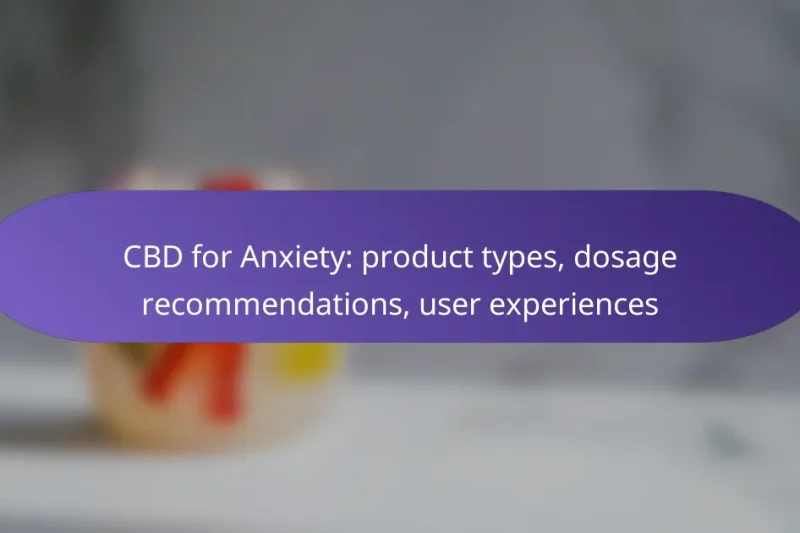CBD herbal tea is a delightful beverage that promotes calming effects through the interaction of cannabidiol … CBD Herbal Tea: calming effects, natural ingredients, soothing experienceRead more
Choosing the Right CBD Product for Your Needs
Choosing the right CBD product can significantly impact your wellness journey, especially when addressing specific needs like pain relief. With various options available, such as full-spectrum CBD oil, capsules, and topical creams, understanding their unique benefits is crucial. Additionally, the differences in absorption methods between CBD oil and edibles can influence your experience, making informed choices essential for optimal results.
CBD Gummies: dosage flexibility, flavor variety, ease of use
CBD gummies offer a convenient and enjoyable way to incorporate CBD into your routine, featuring pre-measured … CBD Gummies: dosage flexibility, flavor variety, ease of useRead more
CBD Vape Pens: portability, ease of use, flavor options
CBD vape pens are the perfect solution for those seeking portability and ease of use, making … CBD Vape Pens: portability, ease of use, flavor optionsRead more
CBD for Pain Relief: product recommendations, dosage guidelines, effectiveness
CBD has emerged as a popular natural remedy for pain relief, with various products such as … CBD for Pain Relief: product recommendations, dosage guidelines, effectivenessRead more
CBD Beverages: types available, health benefits, taste preferences
CBD beverages have gained popularity in the UK, offering a diverse range of options such as … CBD Beverages: types available, health benefits, taste preferencesRead more
CBD Oil Tinctures: potency options, flavor choices, usage methods
CBD oil tinctures provide a versatile option for those seeking the benefits of cannabidiol, with a … CBD Oil Tinctures: potency options, flavor choices, usage methodsRead more
CBD for Anxiety: product types, dosage recommendations, user experiences
CBD has emerged as a popular option for managing anxiety, with various product types available, including … CBD for Anxiety: product types, dosage recommendations, user experiencesRead more
CBD Edibles: variety of options, dosage control, flavor profiles
CBD edibles offer a diverse range of options, from gummies and chocolates to beverages and baked … CBD Edibles: variety of options, dosage control, flavor profilesRead more
CBD Capsules: dosage consistency, convenience, travel-friendly
CBD capsules are an excellent choice for those seeking dosage consistency, as each capsule contains a … CBD Capsules: dosage consistency, convenience, travel-friendlyRead more
CBD Isolate: purity levels, usage versatility, flavor neutrality
CBD isolate is the purest form of cannabidiol, boasting a remarkable 99% purity level that ensures … CBD Isolate: purity levels, usage versatility, flavor neutralityRead more
What are the best CBD products for pain relief in the UK?
The best CBD products for pain relief in the UK include full-spectrum CBD oil, CBD capsules, and topical CBD creams. Each product type offers unique benefits and considerations, making it essential to choose based on personal preferences and specific pain management needs.
Full-spectrum CBD oil
Full-spectrum CBD oil contains a range of cannabinoids, terpenes, and other beneficial compounds from the cannabis plant, which may enhance its pain-relieving effects. This product is often taken sublingually for quick absorption, providing relief within a short time frame.
When selecting a full-spectrum oil, look for products that clearly state their CBD content, typically ranging from 5% to 30%. Start with a lower concentration and gradually increase as needed, while monitoring your body’s response.
CBD capsules
CBD capsules offer a convenient and precise way to consume CBD, making them ideal for those who prefer a familiar method of intake. Each capsule typically contains a specific dose of CBD, allowing for easy tracking of daily intake.
Capsules may take longer to take effect compared to oils, usually around 30 minutes to 2 hours, as they must pass through the digestive system. Choose capsules with a dosage that aligns with your pain relief goals, often ranging from 10 mg to 50 mg per capsule.
Topical CBD creams
Topical CBD creams are designed for direct application to the skin, targeting localized pain areas such as joints or muscles. These products can provide immediate relief without entering the bloodstream, making them suitable for those who want to avoid systemic effects.
When using topical creams, apply a small amount to the affected area and massage it in. Look for products with a clear CBD concentration, typically between 100 mg to 1000 mg per container, and consider combining them with other pain relief methods for enhanced results.
How to choose the right CBD dosage for your needs?
Choosing the right CBD dosage involves starting low and gradually adjusting based on your body’s response. Individual needs can vary widely, so it’s essential to find a dosage that works specifically for you.
Start with a low dose
Starting with a low dose is crucial when trying CBD for the first time. A common recommendation is to begin with a dose of around 5-10 mg per day. This allows you to gauge how your body reacts to CBD without overwhelming it.
As you become familiar with its effects, you can gradually increase the dosage by small increments, such as 2-5 mg every few days. This method helps you identify the optimal dosage while minimizing potential side effects.
Consult with a healthcare professional
Consulting with a healthcare professional is advisable before starting any CBD regimen. A knowledgeable provider can help you understand how CBD might interact with any medications you are currently taking and guide you on appropriate dosages based on your health status.
They can also provide insights into specific conditions that CBD may help alleviate, ensuring that your approach is both safe and effective. This step is particularly important for individuals with underlying health issues or those who are pregnant or breastfeeding.
What are the differences between CBD oil and CBD edibles?
CBD oil and CBD edibles differ primarily in their form, absorption methods, and effects. CBD oil is typically taken sublingually, allowing for quicker absorption, while edibles are ingested and metabolized through the digestive system, resulting in a slower onset of effects.
Absorption rates
CBD oil generally has a faster absorption rate compared to CBD edibles. When taken sublingually, CBD oil can enter the bloodstream within minutes, often taking effect in as little as 15 to 30 minutes. In contrast, CBD edibles can take anywhere from 30 minutes to 2 hours to produce noticeable effects due to the digestion process.
For those seeking immediate relief, CBD oil may be the better option. However, if you prefer a longer-lasting effect and a more discreet method of consumption, edibles might be more suitable.
Duration of effects
The duration of effects from CBD oil and edibles varies significantly. CBD oil typically provides effects lasting around 4 to 6 hours, while CBD edibles can last longer, often between 6 to 8 hours or more. This extended duration can be beneficial for individuals looking for prolonged relief from symptoms.
When choosing between the two, consider how long you need the effects to last. If you require consistent relief throughout the day, edibles may be advantageous, whereas oil might be preferable for short-term use or on-the-go situations.
What should you consider when buying CBD products online?
When buying CBD products online, consider factors such as product quality, brand transparency, and customer feedback. These elements can significantly influence your experience and the effectiveness of the product.
Third-party lab testing
Third-party lab testing is crucial for verifying the quality and potency of CBD products. Look for products that provide lab results from independent laboratories, ensuring they contain the advertised amount of CBD and are free from harmful substances.
Reputable brands often display their lab results on their websites. If you cannot find this information, it may be a red flag regarding the product’s quality.
Brand reputation
Brand reputation plays a significant role in your purchasing decision. Research the company’s history, mission, and values to ensure they align with your expectations.
Check if the brand has received any awards or certifications, as this can indicate a commitment to quality. A well-regarded brand is more likely to provide reliable and effective products.
Customer reviews
Customer reviews offer insights into the effectiveness and reliability of CBD products. Look for detailed reviews that discuss the user’s experience, including any benefits or side effects they encountered.
Pay attention to the overall rating and the number of reviews. A product with a high rating and numerous reviews is generally a safer choice than one with few or mixed feedback.
How do CBD product ingredients affect their effectiveness?
The ingredients in CBD products significantly influence their effectiveness by determining how well the body can absorb and utilize the cannabinoids. Key components, such as carrier oils and additional cannabinoids, play crucial roles in enhancing the therapeutic benefits of CBD.
Carrier oils
Carrier oils are essential for delivering CBD into the body, as they help dissolve the cannabinoids and improve absorption. Common carrier oils include coconut oil, hemp seed oil, and olive oil, each offering different benefits. For instance, coconut oil is known for its high bioavailability, while hemp seed oil provides additional nutrients.
When selecting a CBD product, consider the type of carrier oil used. A product with a high-quality carrier oil may enhance the overall effectiveness of the CBD. Look for oils that are organic and minimally processed to ensure maximum benefits.
Additional cannabinoids
Additional cannabinoids, such as CBG, CBN, and THC, can enhance the overall effectiveness of CBD products through the entourage effect, where various compounds work synergistically. Products that contain a full spectrum of cannabinoids may provide more comprehensive relief compared to those with CBD isolate, which contains only CBD.
When choosing a CBD product, consider whether you prefer full-spectrum, broad-spectrum, or isolate formulations. Full-spectrum products may be more effective for certain conditions but could contain trace amounts of THC, which is subject to legal regulations. Broad-spectrum products offer a similar range of cannabinoids without THC, making them a suitable option for those concerned about drug testing or legal issues.
What are the legal considerations for CBD products in the UK?
In the UK, CBD products must comply with specific legal regulations to be sold legally. These regulations primarily focus on THC content and product labeling, ensuring consumer safety and product transparency.
THC content regulations
In the UK, CBD products must contain no more than 0.2% THC to be classified as legal. This low level of THC ensures that products do not produce psychoactive effects, making them safe for consumers. It is essential for buyers to check the THC content on product labels to ensure compliance with this regulation.
Manufacturers often provide lab reports to verify THC levels, which can help consumers make informed choices. Always look for reputable brands that adhere to these standards to avoid legal issues and ensure product quality.
Product labeling requirements
UK regulations mandate that CBD products must have clear and accurate labeling. This includes information about the product’s CBD and THC content, ingredients, and usage instructions. Labels should also indicate whether the product is full-spectrum, broad-spectrum, or isolate, which informs consumers about the type of cannabinoids present.
Additionally, products must include a warning about the potential effects of CBD and advise against use by pregnant or breastfeeding women. Consumers should carefully read labels to understand what they are purchasing and ensure it meets their needs and legal standards.
What are the potential side effects of using CBD products?
Using CBD products may lead to several side effects, though they are generally mild and vary by individual. Common side effects include fatigue and digestive issues, which can affect users differently based on dosage and personal tolerance.
Fatigue
Fatigue is a potential side effect of CBD, particularly when taken in higher doses. Some users report feeling drowsy or lethargic after consumption, which may impact daily activities. If you experience fatigue, consider reducing your dosage or taking CBD at a time when you can rest.
To manage fatigue, start with a low dose and gradually increase it while monitoring your body’s response. This approach helps identify the optimal amount that minimizes side effects while providing the desired benefits.
Digestive issues
Digestive issues, such as diarrhea or changes in appetite, can occur with CBD use. These effects may stem from the way CBD interacts with the digestive system or from the carrier oils used in CBD products. If you notice gastrointestinal discomfort, it may be beneficial to switch to a different product or formulation.
To mitigate digestive issues, consider trying CBD edibles or oils that are known for being easier on the stomach. Always consult with a healthcare professional if digestive problems persist, as they can help determine the best course of action for your specific needs.
How can you identify high-quality CBD brands?
Identifying high-quality CBD brands involves looking for transparency, third-party testing, and clear ingredient sourcing. Reputable brands provide lab results that confirm the potency and purity of their products, ensuring you get what you pay for.
Look for third-party lab testing
Third-party lab testing is essential for verifying the quality of CBD products. Brands that invest in independent testing demonstrate a commitment to transparency and safety. Check for Certificates of Analysis (COAs) on the brand’s website, which should detail cannabinoid content and the absence of harmful substances.
When reviewing COAs, ensure they are recent and from a reputable lab. Look for results that confirm the product contains the advertised amount of CBD and minimal THC, ideally below 0.3% to comply with federal regulations in the U.S.
Check for clear sourcing and production methods
High-quality CBD brands clearly outline their sourcing and production methods. Look for information on where the hemp is grown, as regions like the U.S. and Europe often have stricter agricultural regulations. Organic farming practices can also indicate a higher-quality product.
Additionally, brands should explain their extraction methods. CO2 extraction is widely regarded as the safest and most effective method for producing high-quality CBD oil, as it preserves the beneficial compounds without introducing harmful solvents.
Read customer reviews and testimonials
Customer reviews can provide valuable insights into the effectiveness and quality of CBD products. Look for brands with a strong reputation and positive feedback from users. Pay attention to reviews that discuss specific benefits and experiences, as these can help gauge product reliability.
Be cautious of brands with overwhelmingly negative reviews or those that lack transparency in their customer feedback. A balanced mix of reviews often indicates a trustworthy brand.









